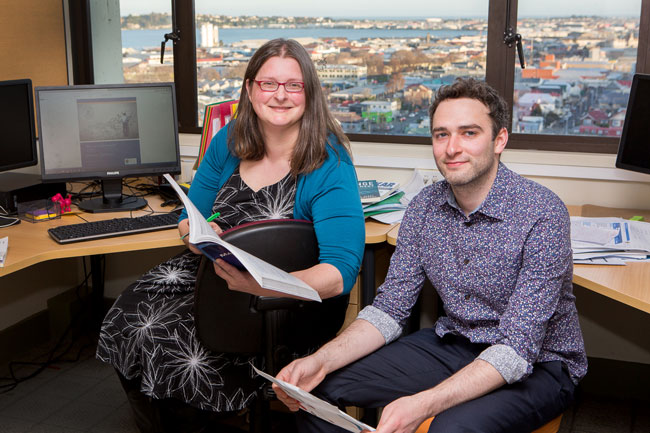Monday 16 July 2018 7:51pm

University-wide service in an office with a wide view … University of Otago Project Management Office Senior Manager Andy Jenkins (right) and Business Case Development Manager Dr Hayley Suter, in the Richardson Building. Photo: Sharron Bennett.
Any staff wishing to seek approval for a project worth more than $250,000 at the University of Otago now have a clear process to follow and can seek advice from an office dedicated to helping with projects.
The new Business Case Framework aims to give all staff the tools to create compelling business cases for change while providing decision-makers with the information they need to make robust, transparent decisions, Chief Operating Officer Stephen Willis says.
Compiling information for a business case creates a strong foundation for the actual project as well – as the saying goes, “the lowest standards that are set at the start of a project are the highest standards that can be expected for the rest of the project. A project that starts poorly never improves.”
A strong business case also creates the framework for delivering the project and monitoring the end product to determine whether it is meeting the needs that were described in the business case.
Help available
With any new approach, getting advice is vital, and the new University of Otago Project Management Office can provide that.
Led by Senior Manager Andy Jenkins, who is supported by Business Case Development Manager Dr Hayley Suter, the office has not been set up to write business cases, but can provide guidance to the people wanting to write one. (The office’s main task is setting and maintaining standards for projects).
Benefits
Mr Willis says creating the Business Case Framework lets the University benefit from reviews of both successful and unsuccessful business cases, which discovered some keys to success.
One main trap is jumping in with a solution based on the symptoms – such as data not flowing fast enough or long queues for service – because the underlying issues usually only really surface by talking to all the stakeholders affected by the proposed project.
They not only identify the problems they are experiencing but what they need to be capable of doing as well, so the project builds a picture of what success looks like for all the stakeholders then merges and manages their expectations into a set of clear, manageable goals.
Knowing from the outset which options are most important to each stakeholder helps to make the right decisions along the way, he says.
A good engagement process should lead to every key stakeholder being able to clearly articulate why the recommended solution is the best, the reasons the University should invest in the proposed project, and the value the University is “buying”.
All those stakeholders will have become strong advocates for the project.
Value
The new framework reinforces the importance of ensuring every project contributes to the University’s strategic goals, because “benefits are not benefits unless they contribute to one or more of the University’s strategic objectives”, Mr Willis says.
The cost of a project is not all that the decision-makers consider when determining whether to approve a business case; they also have a firm eye on the University’s over-arching aims:
- Excellence in research and teaching
- Outstanding student experiences and campus environments
- Commitment as a local, national and global citizen
- Strong external engagement
- Sustaining capability
Preferred option
When all the assessments for the business case have been done, they are combined to produce a clear, logical and evidence-based justification for a preferred option.
The more expensive and complex a proposed project, the more important it is to demonstrate the University can justify investing in it, Mr Willis says.
Project delivery
As part of the mantra “failing to plan is planning to fail,” the person leading the business case and the project sponsor also need to have a tight focus on identifying every risk that could affect the proposed project being delivered successfully and how the project could produce the most benefits possible.
The reviews of business cases found they need to include:
- Comprehensive strategies, arrangements and plans
- Clearly defined accountabilities
- The allocation of enough skilled resources
Business case delivery
The framework includes process guidelines, registers, templates, tools and workshop packages. These can also be found on the Project Tools and Templates section of OURDrive.
Once the business case has been drafted and reviewed by all relevant stakeholders, it is submitted for approval to the appropriate level of University executive.
The University of Otago Project Management Office can provide support at that stage as well, Mr Willis says.
The Operations Group’s three strategic themes are:
Enable – to make possible. The University to achieve its visions and mission by making things possible.
Engage – to involve. We engage with our students, each other and our service users.
Experience – to be outstanding. Experience of out our students, our service users and our service partners will be outstanding.
